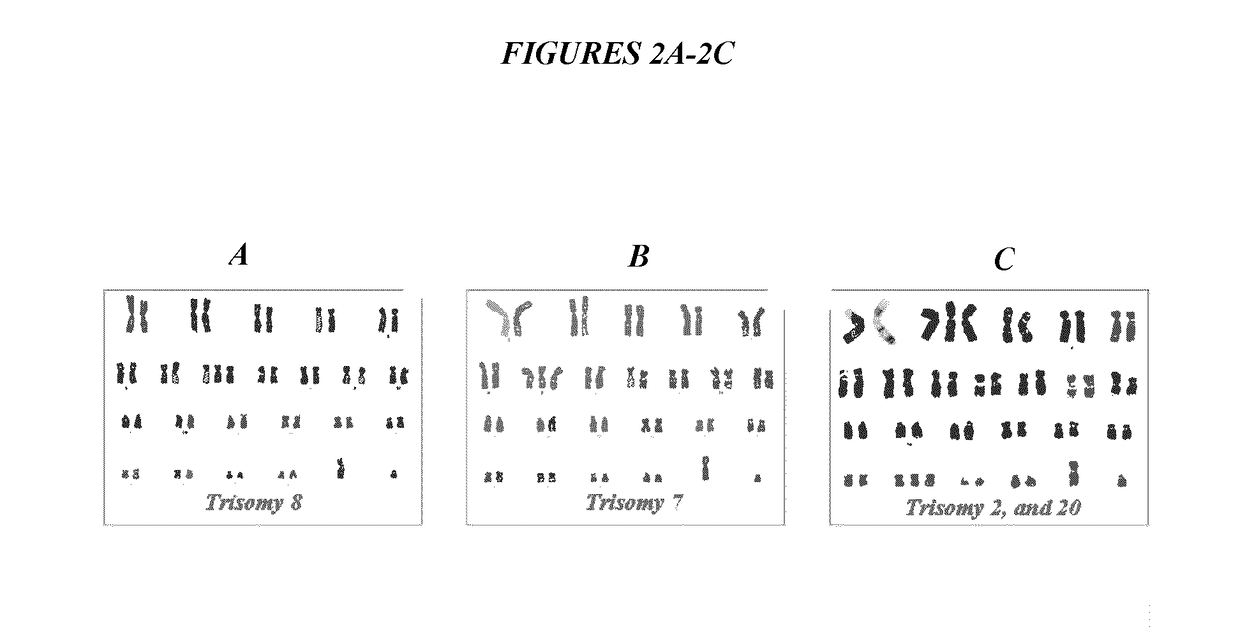Maintenance of genomic stability in cultured stem cells
a stem cell and genomic stability technology, applied in the field of maintaining genomic stability in cultured stem cells, can solve the problems of cell therapy cells that have the potential to develop genomic abnormalities, and reduce the quality of life of many patients, so as to enhance genomic stability and reduce the efficacy of cell therapy
- Summary
- Abstract
- Description
- Claims
- Application Information
AI Technical Summary
Benefits of technology
Problems solved by technology
Method used
Image
Examples
example 1
lterations Decrease in Physiological Oxygen but Unexpectedly Increase with Antioxidant Supplements
[0124]Source human heart biopsies (n=16) were divided and processed in parallel in the various culture conditions, facilitating direct comparisons. CDCs grown under conventional conditions not infrequently included cells with genomic alterations (6 of 16 samples; FIG. 1, Table 1 and Table 2). In reference to FIG. 1, each bar represents a histogram of one sample of stem cells; blue denotes cells with a normal karyotype. Compared with culture in traditional 20% O2 incubator (95% room air / 5% CO2), the number of cells with DNA breaks or translocations (colored green) and losses or gains of chromosomes (red) was decreased when cells were cultured in 5% O2 (p=0.007). When CDCs were cultured in 5% O2, genomic alterations were detected in only 3 of 16 samples (FIG. 1, Table 2). The genomic changes were relatively innocuous: one sample contained one cell with a balanced translocation, another ha...
example 2
nts Decrease Intracellular ROS Monotonically but DNA Damage Shows a Biphasic Response in Stem Cells
[0130]CDCs were initially maintained in traditional 5% CO2 / 20% O2 culture condition and then seeded into 96-well plates and cultured for 24 hours under experimental conditions. Intracellular ROS levels in CDCs exposed for 24 hours to a wide range of antioxidant concentrations (A-B), with catalase (a pure ROS scavenger, C) and hydrogen peroxide (H2O2, a powerful oxidant, D) as controls were measured. The results shown in FIG. 5 are means±Std. Dev. for six separate experiments using different twice-passaged CDCs. (a.u.: arbitrary units. * p<0.01, †p<0.05 vs. the baseline levels, represented by “0” on the x-axis). The results shown in FIG. 6 are representative histograms of the intracellular ROS data obtained by flow cytometry
[0131]Catalase decreased, and H2O2 increased, ROS levels in a progressive dose-dependent manner (FIG. 5C-D, FIGS. 6C-D). Like catalase, antioxidants A and B both dec...
example 3
uppression of Intracellular ROS Down-Regulates ATM and Other DNA Repair Factors
[0136]The protein kinase ATM (ataxia-telangiectasia mutated), is believed to play a role in DNA repair. Intracellular ROS enhances the expression of ATM, which phosphorylates a host of downstream targets in response to DNA double-strand breaks, inducing cell cycle arrest and inhibiting apoptosis. It is possible that excessive suppression of ROS levels might down-regulate ATM, thereby promoting genomic instability. ATM protein levels were indeed decreased at high concentrations of antioxidants A and B (>1000-fold dilution, (>100 μM, respectively), or catalase (>100 units / ml) (FIG. 10A-C). As shown in Panel A, the protein levels of ATM in CDCs were decreased at high doses (10,000-fold dilution) of antioxidant supplements (Antioxidant A). Panel B shows that ATM protein in CDCs decreases at >100 μM, but not at 100 units / ml, but not at 100 μM) of H2O2. Quantitative data are means±standard deviation for four se...
PUM
| Property | Measurement | Unit |
|---|---|---|
| concentration | aaaaa | aaaaa |
| concentration | aaaaa | aaaaa |
| concentration | aaaaa | aaaaa |
Abstract
Description
Claims
Application Information
 Login to View More
Login to View More - R&D
- Intellectual Property
- Life Sciences
- Materials
- Tech Scout
- Unparalleled Data Quality
- Higher Quality Content
- 60% Fewer Hallucinations
Browse by: Latest US Patents, China's latest patents, Technical Efficacy Thesaurus, Application Domain, Technology Topic, Popular Technical Reports.
© 2025 PatSnap. All rights reserved.Legal|Privacy policy|Modern Slavery Act Transparency Statement|Sitemap|About US| Contact US: help@patsnap.com



